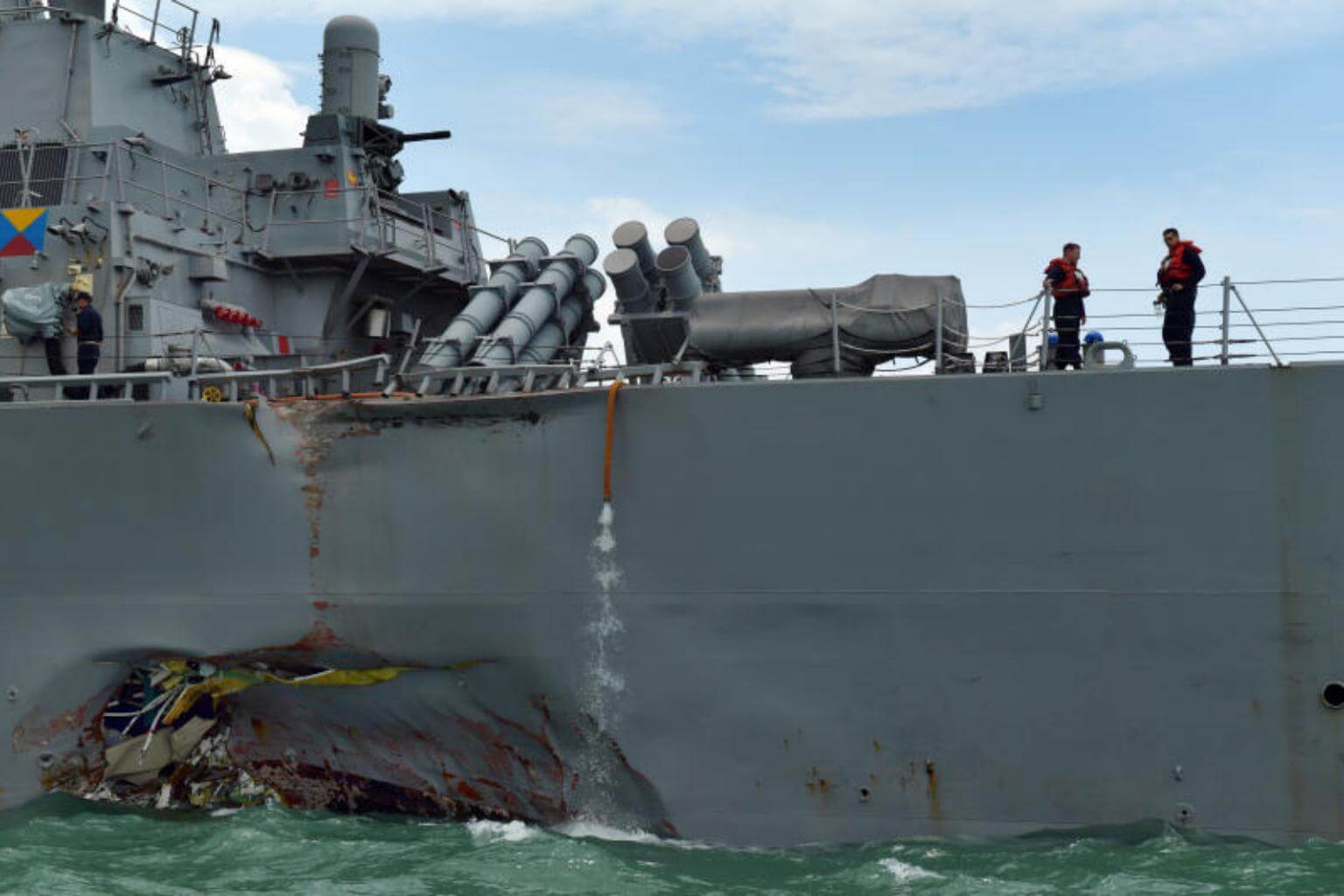After USS John S. McCain collision, Chinese press say US Navy a hazard
Sign up now: Get insights on Asia's fast-moving developments

The guided-missile destroyer USS John S. McCain, which was involved in a collision with oil tanker Alnic MC on Aug 21, 2017.
ST PHOTO: DESMOND FOO
Follow topic:
BEIJING (REUTERS) - The US Navy's two severe collisions within two months showed that its combat readiness level and military management level have both declined and it is becoming an increasing risk to shipping in Asia despite its claims of helping to protect freedom of navigation, Chinese press say.
The USS John S. McCain and the tanker Alnic MC collided while the guided-missile vessel was nearing Singapore on Monday (Aug 21). The collision tore a hole in the warship's port side at the waterline, flooding compartments that included a crew sleeping area.
The collision - the fourth major accident in the US Pacific Fleet this year - prompted a fleet-wide investigation and plans for temporary halts in operations to focus on safety.
The state-run China Daily said in an editorial on Tuesday (Aug 22) that people will wonder why such a sophisticated navy keeps having these problems.
"The investigations into the latest collision will take time to reach their conclusions, but there is no denying the fact that the increased activities by US warships in Asia-Pacific since Washington initiated its rebalancing to the region are making them a growing risk to commercial shipping," it said.
China has been upset at US freedom of navigation operations near Chinese-controlled islands in the disputed South China Sea, where China has been reclaiming land, building air bases and increasing its military presence.
"While the US Navy is becoming a dangerous obstacle in Asian waters, China has been making joint efforts with the members of the Association of South-east Asian Nations (Asean) to draw up a code of conduct for the South China Sea, and it has boosted navigational safety by constructing five lighthouses on its islands," the China Daily said.
"Anyone should be able to tell who is to blame for militarising the waters and posing a threat to navigation."
Later on Tuesday, Chinese foreign ministry spokeswoman Hua Chunying said at a regular briefing in Beijing China hopes the missing sailors are safe.
She also expressed concern for "dangers to freedom of navigation" in the South China Sea and the related area, and hoped it would be "dealt with appropriately."
Global Times, a nationalistic daily, claimed in an editorial published online late on Monday that the US warship mishap was met with "applause from Chinese netizens".
It said the Chinese reaction "reflects the sentiment of Chinese society towards the activities of the US Navy in the South China Sea".
Analysts said the collisions raised questions about whether the US Navy was overstretched in Asia as it seeks to combat Chinese assertiveness in the South China Sea and North Korea's nuclear ambitions.
"China and the US are engaged in a rivalry in the South China Sea. There is a possibility that the two navies will come to a showdown, but it is more likely that the two countries can avoid such a scenario. Both should work on avoiding clashes, while obviously the US Pacific Command did not do that. Its activities only aim at putting China in check," said the Global Times editorial.
"US warships are constantly involved in accidents around the South China Sea. On the one hand, the US Navy has behaved arrogantly in the Asia-Pacific region. It lacks respect for huge merchant ships and fails to take evasive action in time, thus resulting in serious accidents.
"On the other hand, US warships patrol too frequently in the Asia-Pacific. A large number of merchant vessels, of many types and flagged from many nations, use Asian sea lanes. If the US Navy wants to keep its frequent presence in the waters, it needs to get familiar and interact with these merchant ships, which requires huge expenditure."
The editorial said the frequent collisions of US warships with merchant vessels was a warning to the Americans that they should restrain themselves.
"The South China Sea is not the US Navy's Bermuda Triangle,... the inability of the US Navy to adapt to this region requires research by Washington. The geopolitical pattern in the South China Sea keeps changing, and the US should be aware of it,'' it said.
"The South China Sea should become a sea of peace. Its sea lanes should be the safest. All the countries should contribute to peace rather than being an agent of destabilisation. It is hoped that the US Navy can play a constructive role,'' it added.

